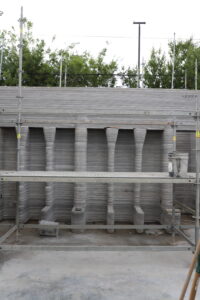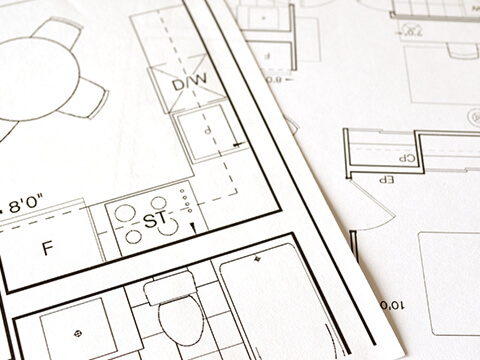- Budget Inaccuracies: Miscalculating a project’s budget can be dire. Underestimating in the best case can result in delays while more funding is secured while in the worst-case scenario it could result in indefinite hiatus or even project abandonment. Comparatively, significant overestimation can cause delays in the approval process, as well as time and resource inefficiency.
- Labor Shortages: Almost every major industry has been experiencing a skilled labor shortage in recent years, and the construction industry is no exception. Accurately estimating the amount of workers necessary to keep a project moving and properly allocating these workers is crucial for a construction project to stay on schedule and avoid delays. Mismanaging the labor that is available to you can also be a source of construction delays stemming from errors and inefficiencies.
- Poor Project Planning: The downfall of construction projects big and small, poor project planning can only hurt your development and your company. Thorough and accurate project planning is necessary for a project to stay on schedule. Without it, the project can be subject to a variety of delays in all steps of the construction process from design approvals to material acquisition.
- Weather and Climate: Linking to poor project planning, failure to account for the weather and climate cycles of your project’s location can result in unavoidable delays. These delays caused by rain, snow, flooding, or other weather occurrences, can set a project behind schedule when not accounted for during scheduling and planning.
- Economic Changes: Economic fluctuations indeed have a significant impact on the construction industry. Changes in the economy can lead to variability in material costs and availability, often resulting in increased prices and potential shortages. These factors can cause delays in project timelines and may necessitate the postponement of construction projects. It’s crucial for project managers to plan for these possibilities and develop strategies to mitigate the risks associated with economic volatility.
- Project Complexity and Uniqueness: The more complex and unique a project is, the more meticulous the planning process. This leaves more room for challenges and delays. Projects
 that need unique or complex components and materials may be subject to material delivery and acquisition delays. Additionally, more complex projects also typically require more specialized labor which may cause labor shortage related delays.
that need unique or complex components and materials may be subject to material delivery and acquisition delays. Additionally, more complex projects also typically require more specialized labor which may cause labor shortage related delays. - Weak Communication: Communication is key to a smooth running, efficient and on-time construction project. Ineffective communication among stakeholders, contractors, sub-contractors, clients, architects, suppliers, and others involved in the construction process can result in delay causing mistakes and errors.
- Approval Process: In the realm of project management, the approval process is a critical phase that can significantly impact the timeline of a project. Delays and complications often arise due to a variety of factors, including bureaucratic hurdles, changes in project scope, or lack of clear communication among stakeholders. To mitigate these risks, it’s essential to establish a streamlined approval process with clear checkpoints, ensure all stakeholders have a common understanding of the project’s goals, and maintain open lines of communication. This proactive approach can help keep projects on track and reduce the likelihood of schedule overruns.
Avoiding common construction delays
- Budget Inaccuracies: Budget inaccuracy related project delays can be avoided by ensuring that your estimates are detailed and accurate. Be sure to have a rigorous budget verification process to ensure the accuracy of the estimates.
- Labor Shortages: One way to avoid labor shortage related delays is to create your schedule based on the labor available instead of trying to find the right about of labor to maintain your construction schedule. Additionally, ensuring proper training and maintaining good worker relations can help to alleviate and avoid labor shortage and mismanagement related delays.
- Poor Project Planning: Project planning primarily occurs in the pre-construction phase of the construction process. These project plans should be detailed and include all phases of construction from the pre-design conceptualizing to the grand opening.
- Weather and Climate: Although you can’t control the weather and climate regardless of planning and budget, it is important to account for bad weather days in your planning process.
 You may not be able to predict when or if these days will be necessary but allocating time for them can prevent weather and climate related delays. Be sure to complete thorough research on the weather and climate of your building location paying special attention to the time of year at which the construction will take place. Utilize historical weather data as well as newer forecasting technologies when completing your research.
You may not be able to predict when or if these days will be necessary but allocating time for them can prevent weather and climate related delays. Be sure to complete thorough research on the weather and climate of your building location paying special attention to the time of year at which the construction will take place. Utilize historical weather data as well as newer forecasting technologies when completing your research. - Economic Changes: Delays caused by economic changes are not entirely avoidable, however, staying updated on market trends, creating relationships with consistent and reliable suppliers, and maintaining buffer stock of essential materials can minimize economic change related delays when they arise.
- Project Complexity and Uniqueness: The easiest way to avoid delays due to project complexity and uniqueness is to stick to simple and straightforward projects. However, this isn’t always an option, so in order to mitigate the risk of project complexity related delays you should makes sure you are doing a thorough and in-depth feasibility assessment, hiring relevant experts and skilled laborers, and completing a comprehensive and detailed risk assessment prior to construction.
- Weak Communication: Communication can make or break a construction project. Establishing effective, efficient, reliable, and easy to use communications systems and channels is of paramount importance when planning and executing a construction project. Avoiding communication delays is as simple as ensuring and maintaining relaible and consistent communication practices. The use of a turnkey design-build firm can help ensure that communication is not only effective and efficient but also that it happens without undue lag time between responses.
- Approval Processes: The approval process can vary based on the type, scale, and location of the construction project. It is important to understand the building codes and requirements on the national, state, and local requirements and codes. Adhering to these codes and requirements and maintaining the proper documentation can ensure a speedy and efficient approval process. In the feasibility phase, a code analysis is usually completed to aid in ensuring building compliance.
Conclusion
Avoiding construction delays boils down to one key practice: preparedness. Being prepared will not ensure that you avoid all construction delays, but it can help to mitigate the consequences of encountering unexpected delays. Allocating time for these potential delays, as well as proper planning and communication can aid in eliminating and managing potential delays to the construction process regardless of which phase your project is currently in. Delays can occur in the pre-construction, construction, and even post construction process and should be planned for accordingly. Whether it be due to bad weather, delays in the approval process, economic changes, or budget inaccuracies, delays can have a huge impact on construction and project management. Maintaining an on-time and efficient construction schedule can help to bolster cost efficiency, quality assurance, client satisfaction, and productivity, along with supporting labor, time, and resource optimization.






